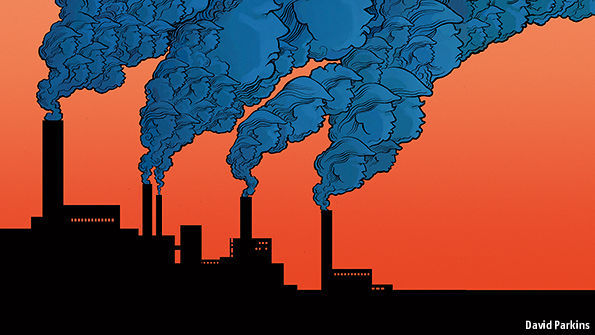
Cynical Europeans can rightly thank Donald Trump on Twitter. Thank you, Mr. President. You make Europe great again. Because this is exactly what the U.S. exit from the Paris Climate Agreement is going to achieve.
Climate protection is the most important political driving force behind a project we in Germany call “Energiewende,” or energy transition. It is part of the so-called “Fourth Industrial Revolution.”* By slowing down climate protection, Trump not only accepts global warming and all its catastrophic consequences, but also undermines the future of companies in his own country.
What Trump Means When He Says, ‘Clean Coal’
It is pointless to speculate about the president’s motives. His confused statements about clean coal, for example, indicate that, at best, he is following partially understood suggestions from managers who profit from fossil fuels. Added to this is a sentimental and nostalgic evocation of America’s supposedly golden age of the 1950s and 1960s with its proud men who drilled for oil, mined coal and assembled classic cars.
Trump’s clean coal refers to the separation of carbon dioxide from the emissions of coal-fired power plants. The greenhouse gas is supposed to be stored underground in a process that is fraught with technical problems. Large energy companies in Europe have long abandoned such efforts.
Wind Power Cheaper than Solar Power
Because – plain and simple – the era of coal is over. Let’s look at the numbers: new coal-powered plants can produce electricity for about 8 cents per kilowatt hour. This does not include the considerable cost of carbon dioxide capture. Solar power in Germany, however, can currently be produced for significantly less than 8 cents.
Wind power on land is even cheaper. And it is as certain as the sun rises in the east that green electricity will drop further in price in the next few years. Modern sea-based windmills will produce electric energy for 5 cents in 2025. In hot regions of the world, solar power will be bought for under 3 cents per kilowatt hour.
Green Electricity Is Becoming a Competitive Advantage
In a globally networked and digitized economy, extremely cheap green electricity is becoming a significant competitive advantage. The fact that industry can reduce its energy requirements by about a third if modern technology is used consistently creates a kind of amplification effect. Mobility will also change fundamentally. There is hardly an expert who doubts that by about 2025, electric cars will be cheaper than gasoline powered ones.
The effect will continue to intensify in the coming years due to ever cheaper green electricity. Ironically, U.S. entrepreneurs like Elon Musk were the first to realize the tremendous economic impact that the interaction of all these components creates. That is why Musk builds electric cars under the brand name Tesla and solar energy systems under that of Solar City. Surprisingly, Trump even invited Musk to join his advisory team.
Government Always Has To Pitch In
The trouble with this kind of transformation –as with all previous revolutions in the capitalist economy – is that it does not happen automatically since the development and use of new technologies in their early stages carries enormous risks for companies. This is why governments have always had to pitch in. The rise of renewable energies is the latest and best example of this. It is ironic that, after years of massive government support, particularly in Germany, the moment has just arrived when wind and solar power are taking off.
The next major project is so-called “sector coupling.” Green electricity must be integrated into the transport system and industrial production. To achieve this, support programs funded by the government are needed to build momentum. Europe has by no means achieved the full potential of these programs. But Europe has at least reached a broad consensus based on an industrial policy which is bound by its final and ethical justification: climate protection.
If Trump now negates climate protection for America and promotes clean coal, then he cuts the U.S. off from the Fourth Industrial Revolution. No wonder that Elon Musk has no desire to advise the president any longer; a reaction which caused him to return his mandate on the president’s advisory team.
*Editor’s note: The Fourth Industrial Revolution, or 4IR, is a term used to describe the fourth major industrial era since the original Industrial Revolution of the 18th century and embraces a range of new technologies that are fusing the physical, digital and biological worlds, including the internet of things, 3-D printing and artificial intelligence.

Leave a Reply
You must be logged in to post a comment.